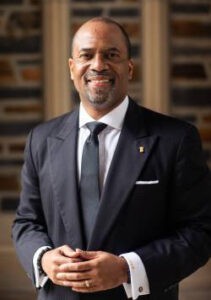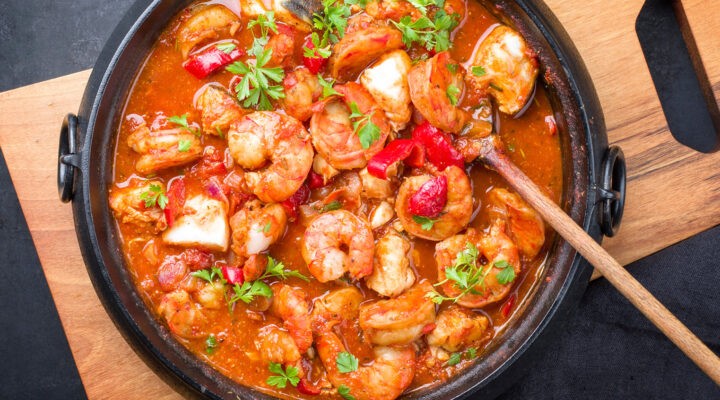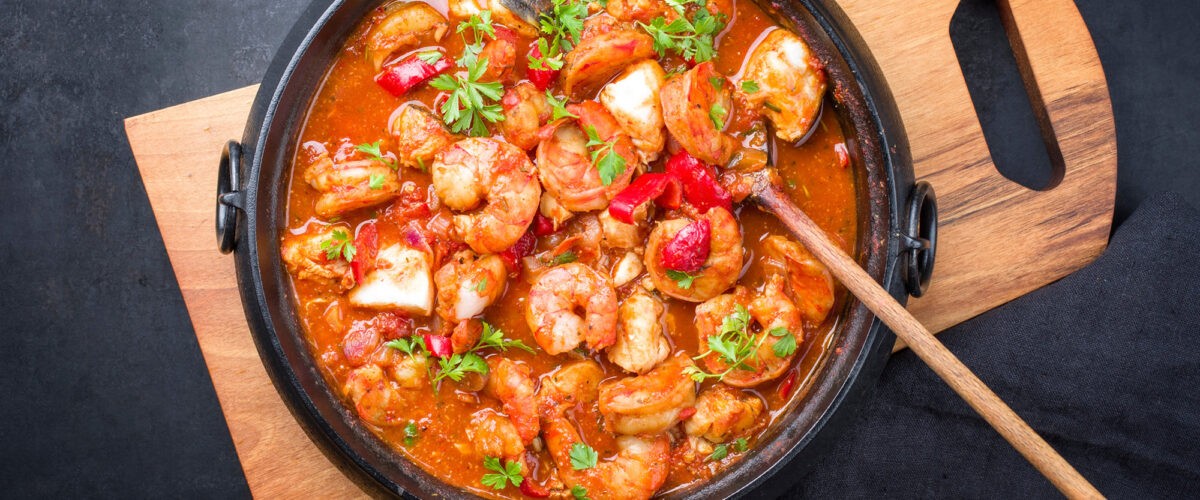Americans can undermine white supremacy and Christian nationalism by emulating the values and actions of the Good Samaritan, Jonathan C. “Jay” Augustine said March 29 to open the Walter B. and Kay W. Shurden Lectures on Religious Liberty and Separation of Church and State.
Jesus told the parable to illustrate that being a true neighbor often means much more than sharing ethnicity, race or faith with someone, said Augustine, senior pastor of St. Joseph AME Church in Durham, N.C., and visiting assistant professor of law at North Carolina Central University School of Law.

Jonathan C. Augustine
“Most important, Jesus teaches how not to draw boundaries of us-versus-them and how to embrace the proverbial other,” he added. “Jesus shows us a real neighbor has less to do with where you live and more to do with your willingness to embrace. Jesus shows us a real neighbor is not someone who will marginalize you because a neighbor will be deliberate in trying to identify with you.”
Augustine said he decided to preach his opening presentation in the annual lecture series because Mercer University’s McAfee School of Theology in Atlanta was the setting. The remaining two lectures will be presented March 30 at Mercer’s main campus in Macon.
The series was launched in 2004 with a gift from the Shurdens to Baptist Joint Committee for Religious Liberty, based in Washington, D.C. Walter Shurden served nearly 25 years as a professor of Christianity at Mercer, where he founded the Center for Baptist Studies. Kay Shurden is an author and church leader and a retired professor from the university’s School of Medicine.
Augustine is author of When Prophets Preach: Leadership and the Politics of the Pulpit, and Called to Reconciliation: How the Church Can Model Justice, Diversity and Inclusion. He speaks and preaches nationally on issues of social and racial justice and serves as a missional strategist for the Duke Center for Reconciliation.
Drawing from his experiences growing up during the 1970s in New Orleans, Augustine said his own concepts of neighbor were drastically overhauled by meeting people in local communities from across the socio-economic and ethnic spectrum.
“Because of the practical impact of Brown v. Board of Education, I had the opportunity to spend time in ‘other’ neighborhoods, too,” he said. “I spent time in white neighborhoods just like I spent time in Hispanic neighborhoods. I spent time in some upper-class neighborhoods, and I spent time in some poor neighborhoods. I began to realize I had a whole lot in common with people who, at face value, were not like me. And I came to redefine my concept of what it is to be a neighbor.”
“I began to realize I had a whole lot in common with people who, at face value, were not like me.”
The real change came by looking past the surface issues that usually create barriers between groups of people, he noted. “Regardless of whether the neighborhoods I visited had lots of creature comforts or were dealing with basic and more modest amenities, once I moved past the social construct of race and past stereotypes that promote xenophobia in the United States of America, I realized that ‘neighbor’ has a lot more to do with shared values and a lot less to do with geography.”
Augustine added that people often erect social barriers against those who do not share geographical proximity. But recent American experience with Christian nationalism proves that is not always the case.
“Mexico is just to our south, and over the course of the last few years, we have been anything but neighborly to Mexico. While buying into the racist and Christian nationalist propaganda, and ‘Make America Great Again,’ we elected a president who campaigned on lines of division, calling people who I thought were our neighbors rapists, drug dealers and murderers.”
Donald Trump and his followers excelled at widening the scope of who they considered as other, Augustine said. “As part of his presidential administration, in the name of something called immigration reform, we issued travel bans against our Muslim brothers and sisters as we started separating children from their families at the U.S. Mexico border, and we played into the divisive rhetoric of building a wall … to separate us from those who otherwise would be our neighbors.”
The building of social and racial walls within the U.S. has continued to accelerate, Augustine added. “We are just one month removed from what was supposed to be a month-long celebration of Black history. Instead, we’re one month removed from a time of self-preservation and self-defense in response to a wedge issue called Critical Race Theory with threats of state legislatures and local school boards trying to ban certain books and trying to un-write Black history.”
Augustine also noted that the April 4 anniversary of the assassination of Martin Luther King Jr. should be a time of reflection on his dream of equality and democracy for all people.
“Now, however, 54 years after his untimely death, democracy is nothing more than an ideal because in the wake of the 2020 presidential election, numerous state legislatures are doing everything they can to thwart democracy and to ensure that many of the people who voted in 2020 will never have that opportunity to vote again.”
“This Good Samaritan must have believed in racial reconciliation as he rejected the impulse of unconscious bias.”
Jesus’ parable models a different way of dealing with the other, he suggested. “The good Samaritan must have rejected differences to find a culture of commonality. He must have rejected those boundaries of Christian nationalism as defined by us versus them, that grow out of a civil religion that has little to do with faith but has everything to do with power. This Good Samaritan must have believed in racial reconciliation as he rejected the impulse of unconscious bias. He must have been a forward-thinking Samaritan who was not concerned about things that divide us. This Samaritan was more concerned about things that unite us.”
The ancient story teaches timeless truth, he added: “As we see more and more lines of division in America, divisions that undermine religious liberty and voting rights and divisions that attempt to un-write Black and Jewish portions of American history, we can all learn a little something from this text because we all should be more deliberate in trying to be someone else’s neighbor.”
Augustine concluded by drawing a parallel between gumbo and the example of inclusion modeled by the Samaritan.
“We must in 2022 learn how to make our own version of gumbo because America can never go back to the proverbial melting pot,” he said. “The melting pot analogy speaks to assimilation. It speaks to giving up your authenticity in trying to fit in so you can belong. By making gumbo, however, we honor individuality while simultaneously coming together to create community. Shrimp can be shrimp. Sausage can be sausage. Chicken can be chicken. And okra can be okra. You don’t have to become something you are not when you are in gumbo. You can be your full and authentic self.”
Related articles:
Global study finds when religion seeks political dominance, the faith suffers
History shows the view is best from the margins | Opinion by David Gushee
Attacks on Critical Race Theory are ‘attempt to maintain the status quo’


